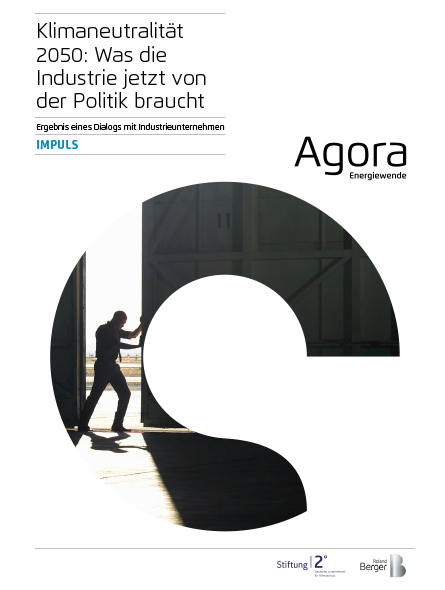Climate neutral 2050: Why German industry needs urgent political action
Germany plans to become climate neutral by 2050. Achieving this represents a challenge for its industrial sector. To do this, the government must create the right framework.


By Heiko Ammermann and Yvonne Ruf
Germany plans to become climate neutral by 2050. Achieving this represents a huge challenge for its industrial sector. But it is also an opportunity for Germany to become a global leader in a climate-protection market set to reach €5.9 trillion by 2025. To do this, however, the government must urgently create framework the right political.

To reach climate neutrality by 2050, Germany must implement a reconstruction of its industrial infrastructure.
Climate change is now a matter of global political importance. At the 2015 Paris Agreement, governments around the world agreed to develop policies that keep global warming well below 2°C and as close to 1.5°C as possible. Germany is no exception. Its Federal Climate Change Act aims for a 55% reduction in greenhouse gas emissions by 2030 and climate neutrality by 2050.
Achieving this will require industry to modernize or replace much of its infrastructure. This will be a huge challenge, but also a tremendous opportunity for Germany to become a leader in a global climate-protection market that could be worth €5.9 trillion by 2025. To seize it, government policy must enable the rapid development, construction and operation of sustainable industrial technologies and facilities. The current political framework does not facilitate this.
So, what needs to change? After intensive exchanges with experts across German industry, Roland Berger, together with think tank Agora Energiewende and cross-industry initiative Foundation 2°, has outlined the key factors for a successful industrial transformation.
To reach climate neutrality by 2050, Germany must implement a holistic reconstruction of its industrial infrastructure. This transition is built on five pillars:
Whether brand new or realigned, Germany’s industrial policies should focus on the following four overarching goals:
Germany and Europe must remain home to productive industrial companies. This creates jobs and prosperity as well as driving change through sustainable materials and technologies.
By 2030, core elements of carbon-intensive industrial facilities will require renewal. Currently, however, there is no business model for these new technologies. To plan effectively, industry needs greater certainty around infrastructure expansion, legal frameworks and economic conditions.
Industry can only implement rapid change under the right political and administrative conditions. Consistent EU state aid law is required to secure subsidies as quickly as possible. Standardization and reduction of technical standards (such as DIN and ISO) is crucial, as are the acceleration of approval processes and modernization of administrative bodies.
Numerous important technologies have already been tested and funded in pilot projects. Now, companies must take the next step and push for large-scale adoption. This is a chance for Germany to become an international leader, particularly in industrial plant engineering.
Achieving both climate neutrality and economic success requires a calculated mix of instruments along the entire industrial value chain.
The industrial sector needs secure access to sufficient green energy and low-carbon materials at competitive prices (upstream). This requires measures to speed up the development of renewable energy supplies and the withdrawal from coal-fired power. International cooperation is important for technologies like hydrogen or CCU/CCS as well as a more circular economy.
In production (midstream), a suitable economic framework is needed to ensure existing processes remain competitive and avoid ‘carbon leakage’ (shifting production to countries with less strict environmental policies).
With sustainable products currently suffering from insufficient demand due to high costs, the sales sector (downstream) also requires changes. Each sector needs a tailored set of incentives and guidelines such as sustainable public procurement, tax benefits and guarantees for high recyclability.
On a more macro level, it is vital that measures are introduced to enable small and medium-sized enterprises (SMEs) to remain profitable on the path to climate neutrality.
Becoming climate neutral will require extensive change across all global economic regions. German industry can play a leading role – if the federal government enables it to. Below are 12 recommendations for federal policy that would help the country to successfully reach domestic climate neutrality and drive international transformation – all while preserving economic success.
Germany plans to become climate neutral by 2050. Achieving this represents a challenge for its industrial sector. To do this, the government must create the right framework.